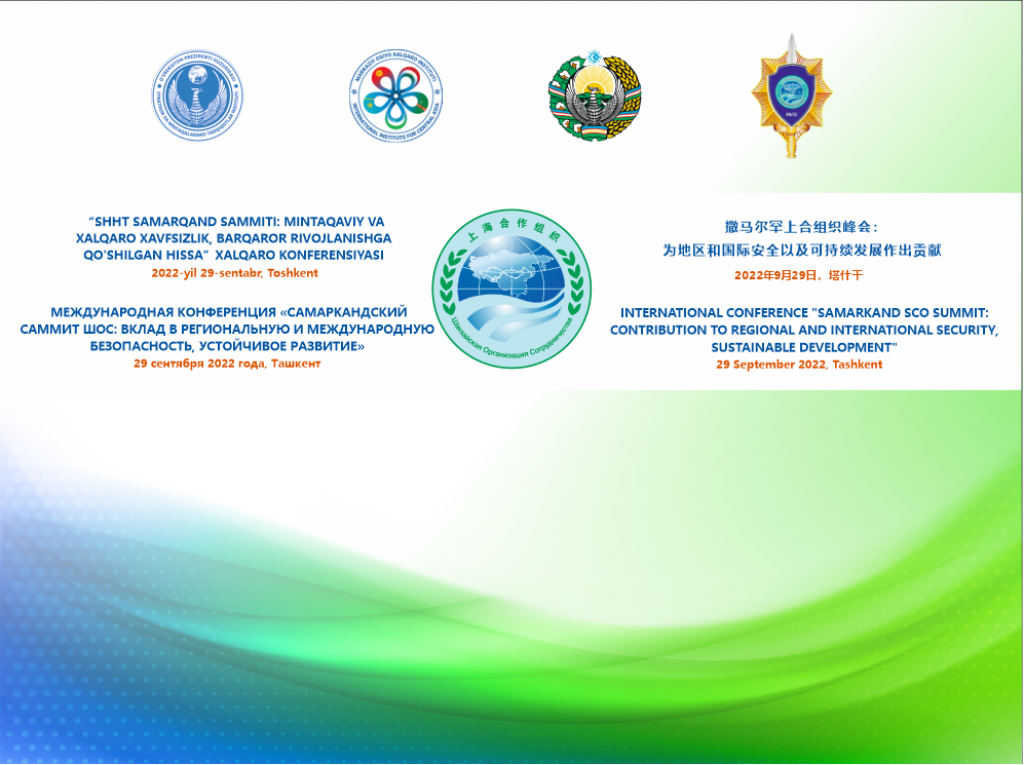Leading experts of analytical structures of the world will summarize and discuss key results of Samarkand SCO Summit

On September 29, Tashkent will host an International Conference “Samarkand SCO Summit: Contribution to regional and international security, sustainable development”.
The event is organized by the Institute for Strategic and Regional Studies under the President of the Republic of Uzbekistan in partnership with the Ministry of Foreign Affairs of the Republic of Uzbekistan, the International Institute for Central Asia, with the assistance of the Executive Committee of the Regional Anti-Terrorist Structure of the SCO.
The Conference plans to bring together more than 30 prominent representatives from among the expert and analytical circles of the SCO member states, as well as several foreign countries, including the United States, Belgium, the United Kingdom, Germany, France, Hungary and other countries.
Foreign participants will be represented by such leading experts as Secretary-General of the China Center for SCO Studies of the Chinese Academy of Social Sciences Deng Hao, Director of the Cambridge Central Asia Forum Siddharth Saxena, President of the Prospective and Security Institute in Europe Emmanuel Dupuy, Director of the Central Asia-Caucasus Institute Svante Cornell and many others.
Heads of Uzbekistan’s leading research institutions will also take part in the event. Among them is the Director of the Institute for Strategic and Regional Studies under the President of the Republic of Uzbekistan Eldor Aripov, Director of the International Institute for Central Asia Anvar Nasirov, Director of the Information Analytical Center for International Relations Doniyor Kurbanov, Director of the Institute of Forecasting and Macroeconomic Research Umid Abidkhojayev.
The agenda of the event will be devoted to discussing the main results of the SCO Summit in Samarkand, as well as issues of further cooperation within the Organization in security, enhancing trade and economic ties, strengthening transport and logistics connectivity and strengthening cultural and humanitarian interaction.
Particular attention will be paid to the Samarkand Solidarity Initiative for Common Security and Prosperity, offered by the President of Uzbekistan as part of his speech on the sidelines of the summit.
The experts will exchange views on the nature and significance of the initiative and develop recommendations on its practical content.
In addition, the conceptual documents signed by the heads of the SCO member states will be considered in detail.
These and many other key issues are planned to be considered during the following four thematic sessions of the upcoming conference:
1. Samarkand initiative – a new format of inter-civilizational dialogue of the future;
2. Further prospects for cooperation between the SCO countries in trade, transport and logistics connectivity;
3. Current issues of ensuring security and stability in the SCO space;
4. Strengthening cultural and humanitarian cooperation is a guarantee of friendship, mutual understanding and sustainable development.
Holding the International Conference “Samarkand SCO Summit: Contribution to Regional and International Security, Sustainable Development” will make it possible to comprehensively assess the results of such a significant event and outline prospects for further development of multifaceted cooperation between the SCO member countries in various fields.
On September 15-16, Samarkand hosted the SCO Summit, which became the largest and most influential political event in the history of the Organization.
It was attended by leaders of 14 states and heads of 10 international organizations. On the sidelines of the summit, 44 documents were signed, most of which are strategically important. They determined new vectors of multilateral cooperation of the member countries in the short and medium term.
At the same time, the Samarkand site has become not only the venue for the SCO Summit, but also the most important bilateral and trilateral negotiations. During these meetings, key issues of global and regional development were discussed. As a result of the talks, important decisions were made that contributed to the reduction of tension in the region.
The Samarkand Summit made an important contribution to the restoration of confidence in the system of international relations and became the so-called starting point for the start of a new stage of interstate and multilateral cooperation based on dialogue and mutual understanding.
Following the event, the main document was adopted – the Samarkand Declaration, which reflects the consolidated positions of the countries on the most important regional and global issues.
It outlines joint approaches to ensuring regional stability, security and sustainable economic development, strengthening transport connectivity, as well as deepening cultural dialogue.






